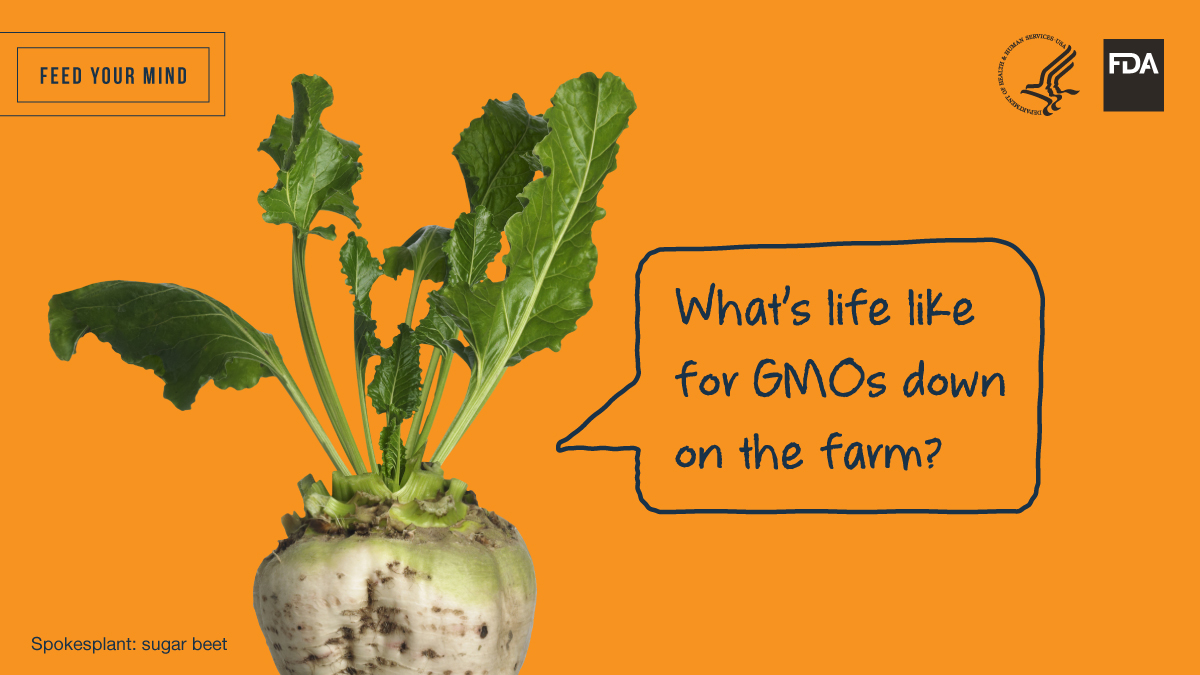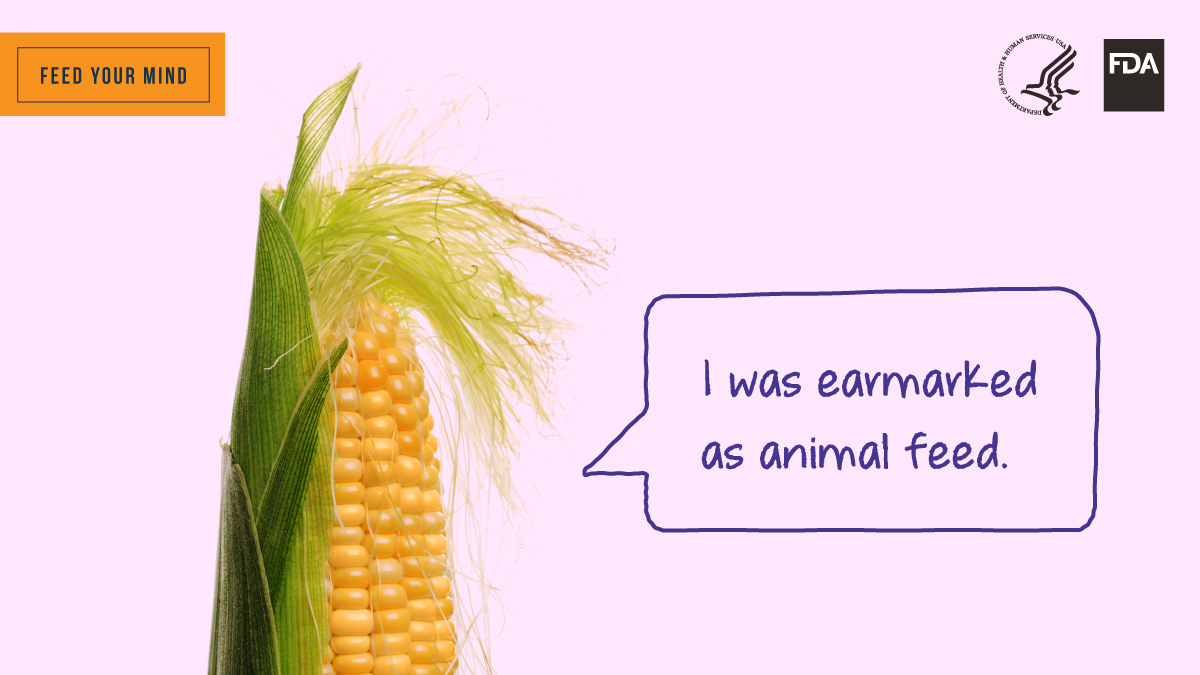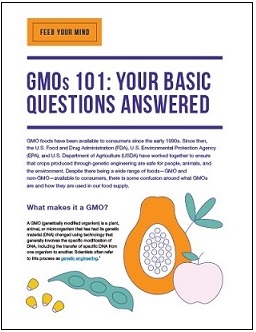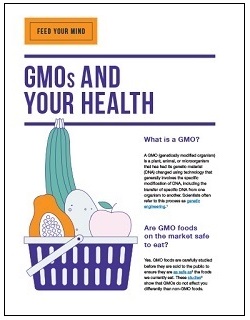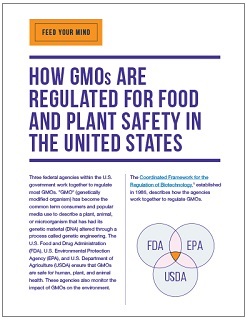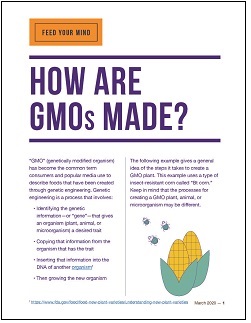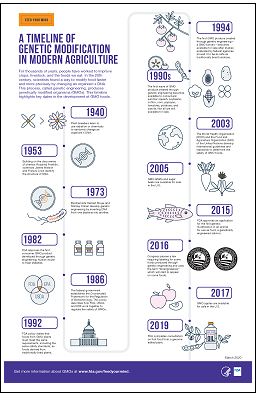Spread the Word About Feed Your Mind: Stakeholder Toolkit
The Feed Your Mind initiative offers science-based, plain-language information in the form of web content, fact sheets, infographics, and videos that you can share with your constituents, members, partners, and other stakeholders to increase their knowledge and understanding of GMOs.
Help spread the word about the U.S. Food and Drug Administration’s (FDA’s) Feed Your Mind initiative by using the sample newsletter and website content, social media posts, images, videos, and educational resources below.
Note: To use the images shown below, copy and paste or right-click on the image and save to your computer.
- Text for Newsletters, Blogs, or Websites
- Facebook/Twitter Posts
- Videos
- Downloadable Images
- Downloadable Fact Sheets
Sample Text for Newsletters, Blogs, or Websites
Initiative Overview
GMO foods have been available since the early 1990s, but there is some confusion around what GMOs are. The U.S. Food and Drug Administration’s (FDA) Agricultural Biotechnology Education and Outreach Initiative aims to increase the awareness and understanding of genetically engineered foods, commonly known as GMOs.
With the launch of this Initiative, FDA encourages you to feed your mind with science-based resources including webpages, fact sheets, infographics, and videos developed in collaboration with the U.S. Department of Agriculture (USDA), and U.S. Environmental Protection Agency (EPA).
Feed your mind with more GMO knowledge at www.fda.gov/feedyourmind.
Quotes
Attributed to Former FDA Commissioner Stephen M. Hahn, M.D.
"While foods from genetically engineered plants have been available to consumers since the early 1990s and are a common part of today’s food supply, there are a lot of misconceptions about them. The Feed Your Mind initiative is intended to help people better understand what these products are and how they are made. Genetic engineering has created new plants that are resistant to insects and diseases, led to products with improved nutritional profiles, as well as certain produce that don’t brown or bruise as easily."
Attributed to Former USDA Under Secretary for Marketing and Regulatory Programs Greg Ibach.
"Farmers and ranchers are committed to producing foods in ways that meet or exceed consumer expectations for freshness, nutritional content, safety, sustainability and more. I look forward to partnering with FDA and EPA to ensure that consumers understand the value of tools like genetic engineering in meeting those expectations."
Attributed to Former EPA Office of Chemical Safety and Pollution Prevention Assistant Administrator Alexandra Dapolito Dunn.
"As EPA celebrates its 50th anniversary, we are proud to partner with FDA and USDA to push agricultural innovation forward so that Americans can continue to enjoy a protected environment and a safe, abundant, and affordable food supply."
Additional Information
- Feed Your Mind materials are based on extensive formative research. To guide development of the Initiative, FDA, USDA and EPA:
- Sought input from stakeholders through two public meetings;
- Opened a docket to receive public comments;
- Conducted more than 40 focus groups comprised of participants representing the diverse backgrounds of consumers across the country; and
- Consulted experts in agricultural biotechnology, education, and communication.
- Feed Your Mind features a wide range of resources designed specifically for consumers, healthcare professionals and students. These materials feature new web content, fact sheets, and videos using common language, engaging graphics, and stories to provide information about genetically engineered foods, including information about the history of genetic modifications in agriculture.
- Feed Your Mind is an ongoing effort, with additional materials such as a professional learning series for dietitians and supplementary science curriculum for high schools planned for release later in 2020 and 2021.
Facebook and Twitter Posts
Most GMO crops grown today were developed to help farmers prevent crop loss. Learn about the most common traits found in GMO crops at this new website from FDA: www.fda.gov/feedyourmind.
Most GMO crops grown in the U.S. are used in food for animals. Find out more about how #GMO crops are used at FDA’s new website: www.fda.gov/feedyourmind.
A GMO is a plant, animal, or organism that has had its DNA changed. Learn more about GMOs with FDA’s #FeedYourMind initiative at www.fda.gov/feedyourmind.
Are you familiar with the term GMO? Did you know there are other words used to describe these products? Find out what they are: www.fda.gov/feedyourmind.

